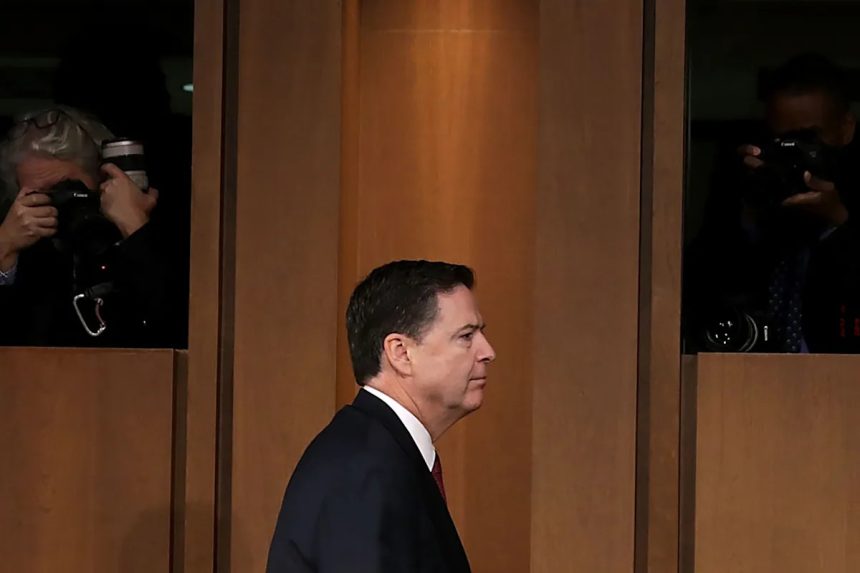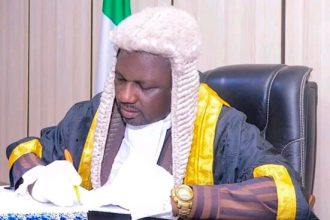A federal grand jury in Virginia on Thursday formally charged former FBI Director James Comey with lying to Congress and obstruction of a congressional proceeding, days after President Donald Trump forced out the U.S. attorney who had opposed bringing the case and publicly urged his attorney general to prosecute it.
The decision by the Justice Department to indict Comey came over the objections of career prosecutors, according to two sources familiar with the case, who assessed that the evidence didn’t support charging Comey with a crime.
Newly installed U.S. Attorney Lindsey Halligan announced the grand jury indictment of Comey just before just before 7 p.m. “The charges as alleged in this case represent a breach of the public trust at an extraordinary level,” her statement read, according to a Justice Department press release. “The balance of power is a bedrock principal of our democracy, and it relies upon accountability and a forthright presentation of facts from executive leadership to congressional oversight. Any intent to avoid, evade, prevent, or obstruct compliance is a violation of professional responsibility and, most importantly, the law.”
The filing of felony charges based on a five-year-old statement to Congress, against a man whom Trump has identified as one of his chief political enemies, underscores the extent to which Trump has shattered the post-Watergate norm that the Justice Department would operate independently of the White House on criminal matters. Trump has not only ended that tradition, but he has bent the Justice Department to his will, firing prosecutors and FBI agents his supporters don’t like, quashing politically inconvenient criminal cases, and pushing for criminal investigations against his adversaries.
Trump named Halligan as the new interim U.S. Attorney for the Eastern District of Virginia this week after her predecessor, Erik Siebert, another Trump appointee, resigned under pressure for expressing reservations about the justification to bring these charges.
Halligan’s announcement said Comey faces up to five years in prison if convicted of making false statements and obstruction related to his September 2020 congressional testimony regarding the FBI’s investigations during the 2016 election campaign.
The Comey case is a prime example of Trump’s promise to punish political adversaries. Trump’s DOJ revived the allegation that Comey misled Congress, despite it having been reviewed and passed over by a Trump-appointed special counsel, John Durham, who brought a skeptical eye to the FBI’s investigation of Russian interference in the U.S. 2016 elections.
As the revived Comey case seemed to stall last week, Trump boasted about forcing out Erik Siebert, the U.S. Attorney he had appointed as chief prosecutor in the Eastern District of Virginia. People familiar with the matter said Siebert opposed prosecuting Comey, believing the evidence did not support charges.
In a Truth Social post addressed to Attorney General Pam Bondi, Trump said Siebert “lied to the media and said he quit, and that we had no case. No, I fired him, and there is a GREAT CASE, and many lawyers, and legal pundits, say so.”
Trump continued, “We can’t delay any longer, it’s killing our reputation and credibility. They impeached me twice, and indicted me (5 times!), OVER NOTHING. JUSTICE MUST BE SERVED, NOW!!!”
Trump replaced Siebert with Halligan, a loyalist who was one of his defense lawyers. She has never served as a prosecutor. Earlier this week, two people familiar with the matter told MSNBC that prosecutors in the office presented Halligan with a memo arguing that there isn’t enough evidence to establish probable cause that Comey committed a crime, the sources reported, let alone enough evidence to convince a jury to convict him.
Justice Department guidelines say a case should not be brought unless prosecutors believe it’s more likely than not that they can get a conviction beyond a reasonable doubt.
Halligan moved forward with the case nonetheless.
This article was originally published on MSNBC.com









